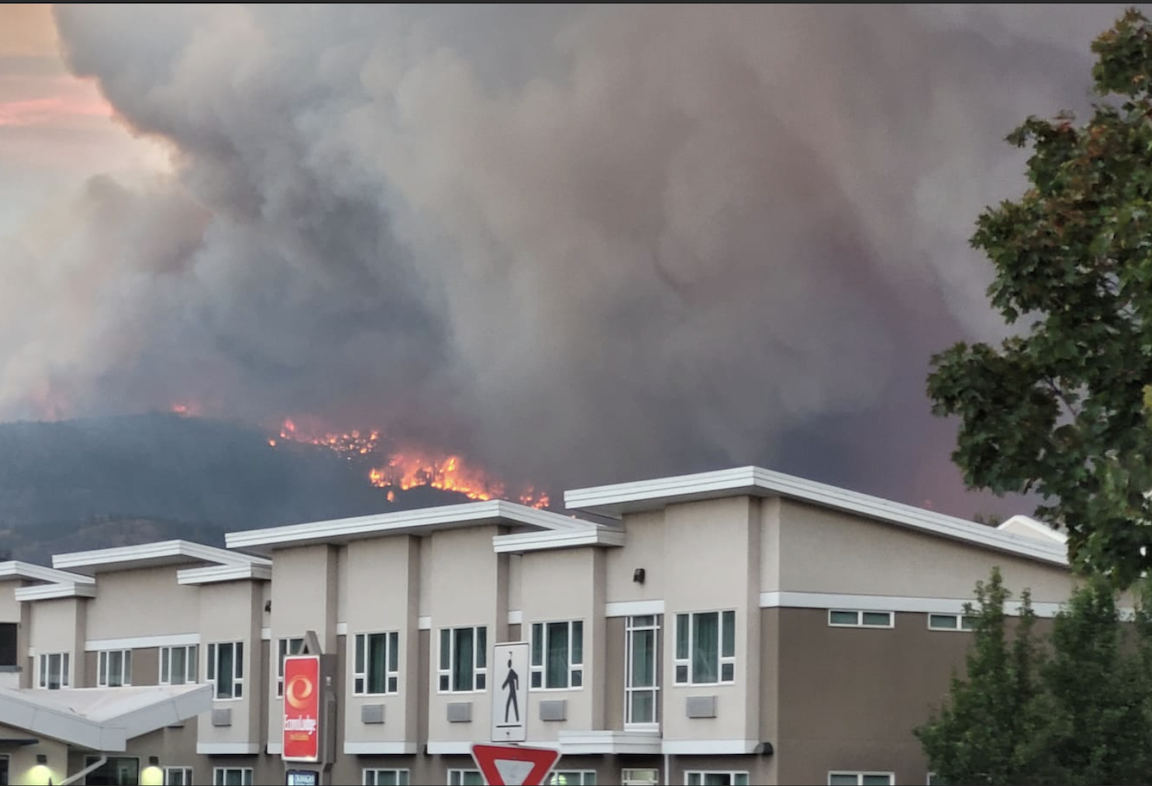By Natalia Luque – ESRAG Latin America Reporter
What would you do if your local government calls you and says that you have an hour to leave your home? The wildfires are going out of control and are coming too close to your house, so you must get yourself and all your family out of danger. What would you put in your bag? In the back of your car?
You would probably leave that place you call home thinking there are so many important memories there, objects you prize, but most of all wondering if you could ever come back. Is that place going to be safe… still there?
In August, 2023 my sister Johanna, who lives in Kelowna, Canada, sent us a message through the family WhatsApp chat. She attached a photo with a circle around her house, with huge smoking fires nearby. She told us they were ready to evacuate. I can’t describe the feeling in my stomach. The images and videos she sent next showed a fire that had spread from 68 hectares to almost 70,000 hectares in just a day.
Taken from the other side of the lake, where they were at a friend’s house with all the possessions they could fit in the car, her photos showed the entire mountain shrouded in smoke. In a phone call she said, “you know how big those helicopters are that they use to drop water on wildfires? Well, now they seem like a fly spitting at a dragón. It is terrifying what we are seeing, hearing and feeling!”
Five months later, the mountains around my hometown in Colombia, South America were on fire, with thousands of plants critical to maintaining the water cycle in our fragile ecosystems destroyed in hours, and many wild animals fleeing to a city of almost 10 million people in search of safety. Even bigger, more destructive wildfires devastated central Chile soon after.
My mind is asking deep questions. What is really important? Do we really need all the objects we have, buy and treasure? Just because there was a sale? Just because I love that brand? Just because it’s the latest collection?… Just because…?
I can’t avoid thinking that climate is no longer a matter of politics. Having seen those wildfires, seen 70,000 hectares of forest, houses, schools, churches, libraries, streets and the dreams of many families killed in suffocating smoke that glowed orange during endless nights, I am convinced this crisis transcends political affiliations, left or right.
Call it whatever you want – climate change or global warming – or if you think that all this is a fiction made up by the media – and you have a right to think so – no matter how our views vary about the climate crisis, as Rotarians we are united by several convictions: helping others, taking action, changing the world for good, making the world a safer and healthier place for all.
So, if reducing unnecessary purchases can help, why not do it? If using fewer disposable objects can help, why not make our meetings, parties, conventions more eco-friendly? If walking can help our health and reduce carbon emissions, why not walk instead of using a car?
Are we counting the economic costs of this devastation, the time it is going to take to replace those vast areas of destroyed forest, and to restore the ecological services they gave to humanity? Are we counting the costs of detoxifying water to be able to take a bath, wash a car or our pets after the companies we love dump chemicals that poison our water supply? Are we fine eating microplastics and chemicals just because we don’t see them or sense them?
We can make true changes in our daily lives, in our clubs, and create a positive impact on the people around us. We don’t need so many objects, cleaning products, or clothes. After all, how many of those things will you be able to stuff in a bag if you have to evacuate your home.
Natalia Luque Sanchez is a biologist and member of the Zipaquirá Global Club in Colombia.

